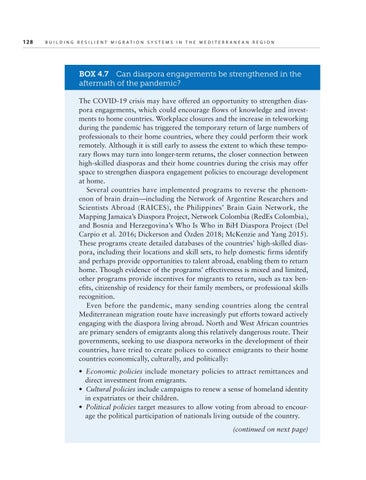128
B U ILDING RESILIENT MIGR A TION S Y STEMS IN T H E MEDITERR A NE A N REGION
BOX 4.7 Can diaspora engagements be strengthened in the aftermath of the pandemic? The COVID-19 crisis may have offered an opportunity to strengthen diaspora engagements, which could encourage flows of knowledge and investments to home countries. Workplace closures and the increase in teleworking during the pandemic has triggered the temporary return of large numbers of professionals to their home countries, where they could perform their work remotely. Although it is still early to assess the extent to which these temporary flows may turn into longer-term returns, the closer connection between high-skilled diasporas and their home countries during the crisis may offer space to strengthen diaspora engagement policies to encourage development at home. Several countries have implemented programs to reverse the phenomenon of brain drain—including the Network of Argentine Researchers and Scientists Abroad (RAICES), the Philippines’ Brain Gain Network, the Mapping Jamaica’s Diaspora Project, Network Colombia (RedEs Colombia), and Bosnia and Herzegovina’s Who Is Who in BiH Diaspora Project (Del Carpio et al. 2016; Dickerson and Özden 2018; McKenzie and Yang 2015). These programs create detailed databases of the countries’ high-skilled diaspora, including their locations and skill sets, to help domestic firms identify and perhaps provide opportunities to talent abroad, enabling them to return home. Though evidence of the programs’ effectiveness is mixed and limited, other programs provide incentives for migrants to return, such as tax benefits, citizenship of residency for their family members, or professional skills recognition. Even before the pandemic, many sending countries along the central Mediterranean migration route have increasingly put efforts toward actively engaging with the diaspora living abroad. North and West African countries are primary senders of emigrants along this relatively dangerous route. Their governments, seeking to use diaspora networks in the development of their countries, have tried to create polices to connect emigrants to their home countries economically, culturally, and politically: • Economic policies include monetary policies to attract remittances and direct investment from emigrants. • Cultural policies include campaigns to renew a sense of homeland identity in expatriates or their children. • Political policies target measures to allow voting from abroad to encourage the political participation of nationals living outside of the country. (continued on next page)

